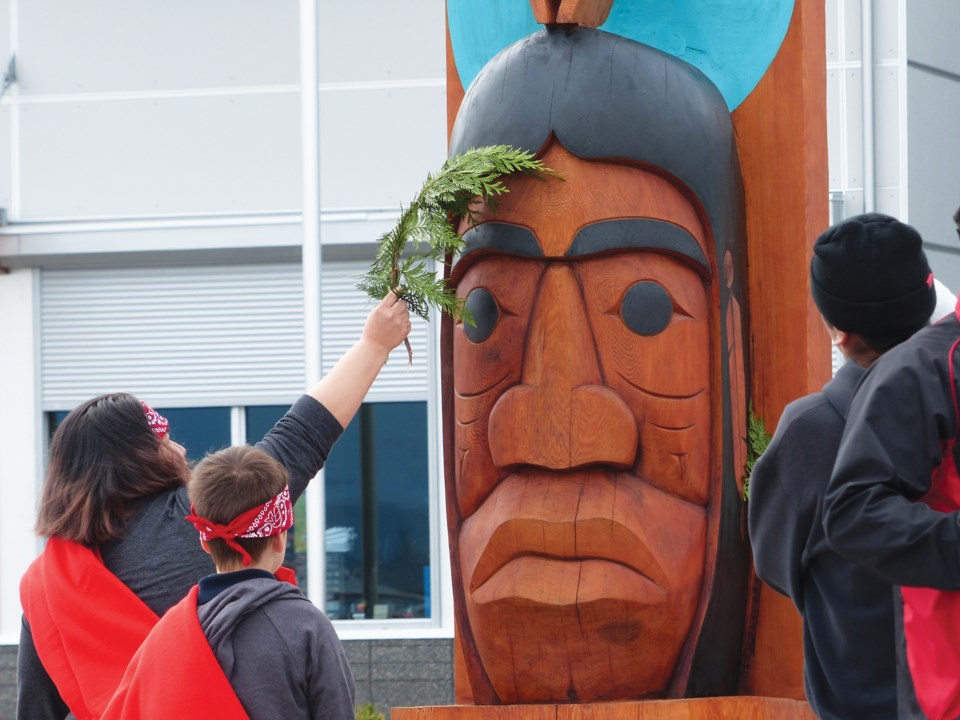Gibsons council is taking measures to acknowledge the municipality’s Indigenous connections through two related measures: using the United Nations Declaration on the Rights of Indigenous Peoples (UNDRIP) as a framework for reconciliation, and updating its streets, parks and facilities naming policy.
At an April 6 committee-of-the-whole meeting, councillors voted unanimously that UNDRIP be adopted and implemented, to be used “as the framework for Indigenous reconciliation.”
Councillors also directed staff to draft a policy “reflecting council’s goals and objectives for the implementation of UNDRIP.”
Earlier in March, council had asked staff to report on how that implementation might look.
Among the suggestions provided on April 6 was for the town to “co-develop with the Sḵwx̱wú7mesh Nation a framework for a new approach to policy and principles, while reflecting and representing our shared cultures and identities,” as well as upholding the rights and titles of Sḵwx̱wú7mesh Nation.
Council supported the idea of a framework, with Coun. Aleria Ladwig recommending it be developed bilaterally and signed off by both the town and Sḵwx̱wú7mesh Nation. The federal government is beginning to take similar measures on a regular basis, she said.
Mayor Bill Beamish noted a protocol agreement is already in place with Sḵwx̱wú7mesh Nation.
Council also voted to update its street, parks and public facilities naming policy to recognize Indigenous culture and values.
As currently written, the policy’s objective “is to provide a consistent approach to the naming of roads, parks and public facilities in the Town of Gibsons, while recognizing the rich history of the Town.”
Included in that history is a reference to early settlers, community builders and volunteers, but as Newman told councillors, “the policy has largely been silent on anything to do with the people who were here thousands of years before any colonists landed on the shore.”
Staff suggested retiring a list of settlers’ names included in the policy and adding a new list of traditional names, in collaboration with council and Sḵwx̱wú7mesh Nation “if appropriate,” and pending more meetings with the nation.
Staff provided a few draft lists as part of the report: Capilano, Salish and Squamish were the suggested First Nations names. Other names referenced “local aquifer features,” including Alluvial, Vashon and Thalweg. Plant names such as Alder, Dogwood, Dandelion, Cedar and Manzanita were also added.
“First Nations are very connected to the land and, although these names are in the English language, they move towards a naming convention that is more suitable to current times,” said the report.
The amended naming policy could be applied to up to seven roads associated with the Gospel Rock development, suggested staff, including three new roads, the Chaster extension, the Shaw/Inglis connector, and the Gospel Rock section of Shaw Road and a section of Charman Road.
Developers and the public could still suggest names for council’s consideration.
Beamish said he’s discussed place names with Sḵwx̱wú7mesh Nation Coun. Chris Lewis, who supported moving forward on the initiative.
“My conversation with Chris Lewis was, as you drive the Sea to Sky highway and go up to Squamish and beyond, you know whose territory you’re in. As you get off the ferry in Langdale, you don’t know where you are.”
The town should also work with the nation on conventions for including English versions of traditional names, said Beamish, such as the use of brackets or hyphens. “Not everybody has the ability to easily read and pronounce in the Sḵwx̱wú7mesh tongue,” he said.
The list provided with the draft policy changes would be “far more expanded” following consultation, said Beamish. “What did they call Gospel Rock, for example?” he said.
Coun. Annemarie DeAndrade suggested focusing on areas that are the most significant to the nation. Ladwig agreed that could help prioritize names, especially if developers come forward with their own suggestions.
Councillors also approved a request from Parkland developers that Fisher Crescent be approved as a name for a road in their development, in recognition of the late Celia Fisher, who served as a school board trustee, Sunshine Coast Regional District director and volunteer in the community.


